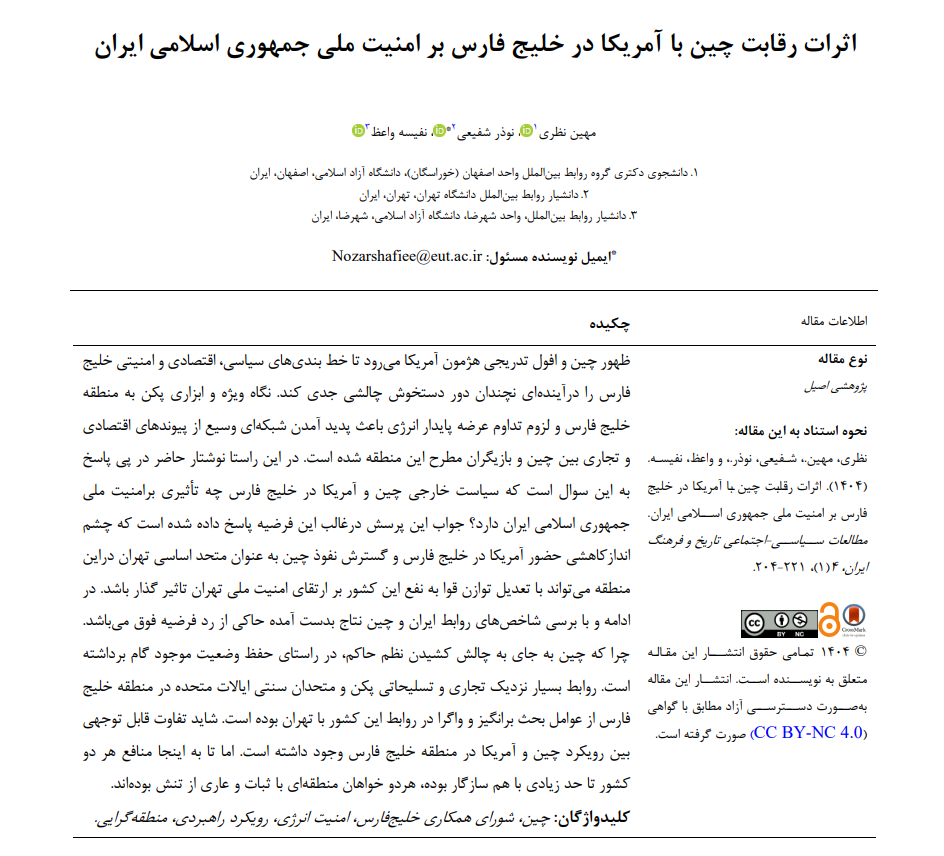اثرات رقابت چین با آمریکا در خلیج فارس بر امنیت ملی جمهوری اسلامی ایران
کلمات کلیدی:
چین, شورای همکاری خلیجفارس, امنیت انرژی, رویکرد راهبردی, منطقهگراییچکیده
ظهور چین و افول تدریجی هژمون آمریکا میرود تا خط بندیهای سیاسی، اقتصادی و امنیتی خلیج فارس را درآیندهای نچندان دور دستخوش چالشی جدی کند. نگاه ویژه و ابزاری پکن به منطقه خلیج فارس و لزوم تداوم عرضه پایدار انرژی باعث پدید آمدن شبکهای وسیع از پیوندهای اقتصادی و تجاری بین چین و بازیگران مطرح این منطقه شده است. در این راستا نوشتار حاضر در پی پاسخ به این سوال است که سیاست خارجی چین و آمریکا در خلیج فارس چه تأثیری برامنیت ملی جمهوری اسلامی ایران دارد؟ جواب این پرسش درغالب این فرضیه پاسخ داده شده است که چشم اندازکاهشی حضور آمریکا در خلیج فارس و گسترش نفوذ چین به عنوان متحد اساسی تهران دراین منطقه میتواند با تعدیل توازن قوا به نفع این کشور بر ارتقای امنیت ملی تهران تاثیر گذار باشد. در ادامه و با برسی شاخصهای روابط ایران و چین نتاج بدست آمده حاکی از رد فرضیه فوق میباشد. چرا که چین به جای به چالش کشیدن نظم حاکم، در راستای حفظ وضعیت موجود گام برداشته است. روابط بسیار نزدیک تجاری و تسلیحاتی پکن و متحدان سنتی ایالات متحده در منطقه خلیج فارس از عوامل بحث برانگیز و واگرا در روابط این کشور با تهران بوده است. شاید تفاوت قابل توجهی بین رویکرد چین و آمریکا در منطقه خلیج فارس وجود داشته است. اما تا به اینجا منافع هر دو کشور تا حد زیادی با هم سازگار بوده، هردو خواهان منطقهای با ثبات و عاری از تنش بودهاند.
دانلودها
مراجع
Behboudinejad, G. (2023). The Persian Gulf between the United States' Indo-Pacific strategy and China's Belt and Road Initiative. Foreign Policy Quarterly, 36(4), 145-174.
Belal, K. (2020). China-Iran Relations: Prospects and Complexities. Policy Perspectives, 17(2), 47-66. https://doi.org/https://doi.org/10.13169/polipers.17.2.0047
Burgess, R. L., Jr. (2010). Statement before the United States Senate Committee on Armed Services on Iran's Military Power. http://www.dia.mil/public-affairs/testimonies/2010-04-13.htm
Clinton, H. (2011). America's Pacific Century. [Link not provided]
Donilon, T. (2011). America is back in the Pacific and will uphold the Rules.
Fulton, J. (2022). China and the Persian Gulf: Hedging Under the U.S. Umbrella. Handbook.
Garlick, J., & Halvova, R. (2020). China's Belt and Road Economic Diplomacy in the Persian Gulf: Strategic Hedging amidst Saudi-Iranian Regional Rivalry. Journal of Current Chinese Affairs, 49(1), 82-105. https://doi.org/https://doi.org/10.1177/1868102619898706
Gillard, M. (2006). Hegemonic Stability theory and the evolution of the space weaponization regime during the cold war Thesis submitted in partial fulfillment of the requirement for the degree of M.A., University of British Columbia].
Holmes, J. R., & Yoshihara, T. (2008). China's Naval Ambitions in the Indian Ocean. Journal of Strategic Studies, 31(3), 360-378. https://doi.org/https://doi.org/10.1080/01402390802024700
Holslag, J. (2009). Embracing Chinese Global Security Ambitions. Washington Quarterly, 32(3), 105-118. https://doi.org/https://doi.org/10.1080/01636600903035373
Kamrava, M. (2018). Troubled Waters: Insecurity in the Persian Gulf. Ithaca, NY: Cornell University Press. https://doi.org/https://doi.org/10.7591/cornell/9781501720352.003.0003
Khan, Z. (2016). China-India Growing Strides for Competing Strategies and Possibility of Conflict in the Asia-Pacific Region. Pacific Focus, 31(2), 232-253. https://doi.org/https://doi.org/10.1111/pafo.12072
Lei, D. (2008). China's New Multi-Faceted Maritime Strategy. Orbis, 52(1), 139-157. https://doi.org/https://doi.org/10.1016/j.orbis.2007.10.009
Medcalf, R. (2015). Reimagining Asia: From Asia Pacific to Indo Pacific.
Sadiq Bat'haei Asl, M., Mirabrahimi, M., & Sabri, M. (2015). Examining the impact of the security presence of the United States and China in the geopolitical domain of the Persian Gulf on the national security of the Islamic Republic of Iran. Cultural and Political Studies of the Persian Gulf, 2(6), 9-35.
Stewart, P. (2019, March 24). With an Eye on Iran, U.S. Clinches Strategic Port Deal with Oman. https://af.reuters.com/article/worldNews/idAFKCN1R50JZ?feedType=RSS&feedName=worldNews
World Bank. (2018). Belt and Road Initiative. [Link not provided]








